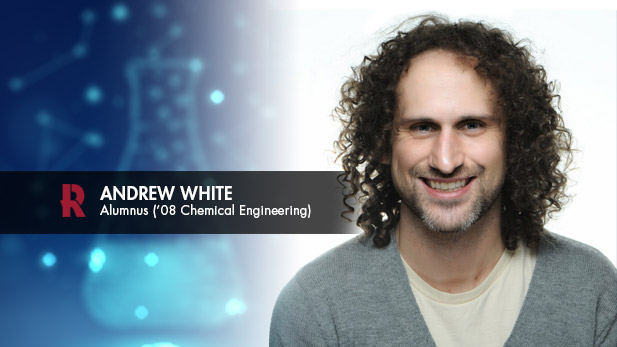Rose-Hulman Alumnus at the Intersection of Artificial Intelligence and Chemistry

Andrew White, a 2008 chemical engineering graduate, is the head of science for FutureHouse, a San Francisco-based nonprofit organization that is building an AI Scientist. White also created an AI chemist system that coupled AI with a robotic laboratory called ChemCrow.
The concept of Artificial Intelligence (AI) has almost seamlessly integrated itself into the modern workplace — from higher education to content creation — especially over the last several years. This is especially true with programs like ChatGPT that revolutionize how tasks are executed and content is created. But asking a machine to conduct scientific research is another concept entirely. Yet that’s exactly what Andrew White, a 2008 chemical engineering graduate, is working to create.
White is the head of science for FutureHouse, a San Francisco-based nonprofit organization that is building an AI Scientist. Future House, backed by former Google CEO Eric Schmidt, has completed its first project: developing AI tools that can analyze and summarize research papers, as well as respond to scientific questions using large language models. This is the same technology that supports popular AI chatbots like ChatGPT. FutureHouse now has a biology lab and is growing to continue automating more steps of the scientific method. The hope is for the AI Scientist to be an autonomous research assistant that will accelerate the speed of scientific discovery and help tackle key challenges facing humanity including antibiotic resistance, food security, and climate change.
White also created an AI chemist system that coupled AI with a robotic laboratory called ChemCrow. “The pace of discovery is incredible,” said White. “For example, some of the things we could ask the system is to make an insecticide, and it would look up what that is, what the chemical structure would look like, and the robot would make the insecticide and then characterize the molecule as an insecticide. That type of innovation is a huge jump from where we were in the chemistry field just two years ago.”
White is also an associate professor of chemistry at the University or Rochester, where he has worked since 2015. He is on sabbatical from teaching and research to work on-site at FutureHouse creating the AI Scientist.
“The reason why I am doing this is the pace of discovery has gotten so quick that we are now at a point to scale these ideas. … This can fundamentally transform how we do science,” he said.
FutureHouse is starting with the field of biology, but its system will eventually be applicable to other scientific fields. The AI Scientist released its first result in December 2023, which was a parallel version of Wikipedia focused on biology. The AI Scientist wrote 20,000 articles that covered the entire human genome. Every article summarized scientific literature and contained an accurate citation.
“If you speed up biology, you can answer questions like, ‘What is the origin of life?’ and ‘How does the brain work?’” said White. “This is a new way of doing science. It won’t solve all the problems for us, but it allows us to work at a faster pace and at a bigger scale.”
Originally from Vancouver, Washington, White has become a prominent figure in the field of AI and deep learning. Within AI, there exists machine learning and within that, there is deep learning. In deep learning, there are transformers, which power platforms like ChatGPT. White’s delve into deep learning began in 2019 while attending a meeting of the Institute for Pure and Applied Mathematics at University of California, Los Angeles. The meeting focused on what could be possible in machine learning and included attendees from Google and the head of AI for Facebook at the time. White wrote a textbook about what he learned and taught classes at University of Rochester that centered around the concepts that came from the deep learning conference. He then worked on transformer machines, including Codex and DaVinci, early predecessors to ChatGPT, and wrote several papers applying these concepts to chemistry.
When GPT4 was developed — a multimodal large language model created by OpenAI — White was asked to be a red teamer to test the risks of using it in the field of chemistry. This led to him meeting with representatives from the White House, National Security Council, and international governments about potential AI policies. He co-authored a paper entitled “ChemCrow: Augmenting large-language models with chemistry tools,” which won best paper at an international AI workshop. This experience paved the way for White to begin his work at FutureHouse.
White traces much of his academic success to his undergraduate years at Rose-Hulman. He believes the college’s emphasis on “computer first” education with each student receiving a laptop loaded with all the software programs needed for their courses was an innovative concept and helped Rose stand out among its competitors. He also appreciated the opportunities to conduct research and work independent ally with professors.
Additionally, White studied abroad in Germany and believes those international learning experiences significantly broadens one’s perspective and helped him learn how the world works. White is still in touch today with many of the individuals he met while studying abroad.